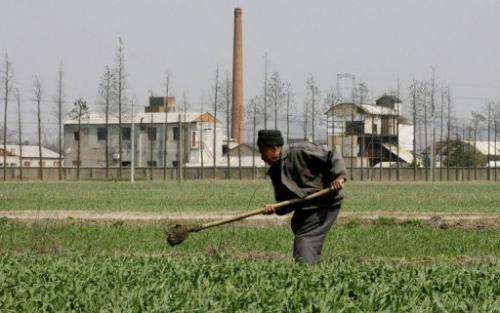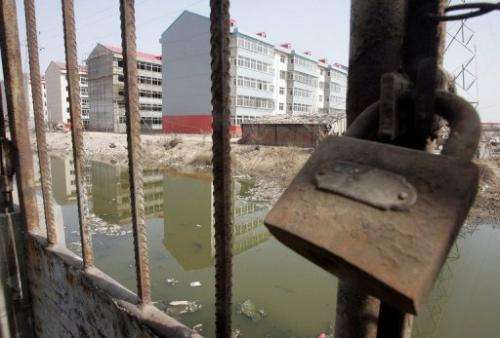A farmer works next to a chemical factory in Yixing town, Jiangsu province, March 2006. A Chinese lawyer has appealed against an official refusal to release the results of a national soil pollution survey on the grounds that it was a "state secret", he told AFP on Wednesday.
A Chinese lawyer has appealed against an official refusal to release the results of a national soil pollution survey on the grounds that it was a "state secret", he told AFP on Wednesday.
China's environmental protection ministry said the survey results were a state secret after Beijing lawyer Dong Zhengwei applied for them to be released, the Legal Daily newspaper reported.
Dong blasted the ministry's refusal on Wednesday, calling it a "clear denial of the public's right to know and right to monitor", and saying he had appealed against the decision on the basis of China's freedom of information regulations.
China's government has come under increasing pressure to take action on pollution in recent months, with large areas of the country blanketed in thick smog, and online campaigners highlighting China's polluted rivers.
A padlock secures a gate leading to a polluted river once used for swimming by local youths, in Liukuaizhuang Village in Tianjin. China's government has come under increasing pressure to take action on pollution in recent months, with large areas of the country blanketed in thick smog, and online campaigners highlighting China's polluted rivers.
Authorities last year released more accurate data about air pollution in response to public demands, but have kept confidential the survey on soil pollution. It is one of China's most serious environmental issues, linked to cancer and other health problems.
The environmental protection ministry recently acknowledged the existence of "cancer villages", years after Chinese media first reported on more than 100 polluted rural areas with a higher incidence of the disease.
"Poisonous and harmful chemical materials have brought about many water and atmosphere emergencies... certain places are even seeing 'cancer villages'," a five-year plan released by the ministry stated.
The soil survey was carried out over five years at a cost of one billion yuan ($160 million), the state-run Global Times reported.
Dong said he was "not optimistic" that his appeal would succeed.
"Through our actions we can monitor and put pressure on the ministry of environmental protection to release the information, but I don't think they'll release it in the near future," he said.
(c) 2013 AFP

























